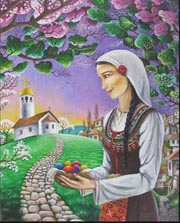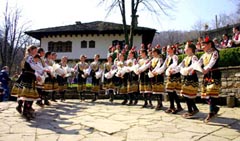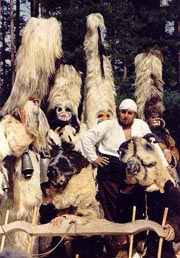The Week before Easter Lent includes some interesting customs and rituals of asking forgiveness from parents, relatives, friends and neighbors. The entire week is meatless. Sunday, the last day, is known as Pokladi or Zagovezni. This is the time when younger people visit their parents and relatives and after kissing the right hand of the older person ask to be forgiven for any intentional or unintentional deeds that may have caused misunderstanding or strained relations. The Zagovezni supper ends with an exciting custom of Lamkane. A boiled egg or a piece of hard candy is tied to a thread and suspended from the ceiling above the dining table. Then it is swung in a circle so that all participants would have an equal chance of catching the egg or candy in the mouth. Fire also plays an important part at Zagovezni. Young boys make ORATNITSI by stuffing straw into fresh willow sticks whose upper end is split about a half yard down. After darkness the youngsters light their Oratnitsi and for a few minutes swing them like burning torches. Piles of easily burning wood are accumulated in public places where people come to watch, play or dance around the bonfire. Of the frolics that take place during the last week before the Great Lent the KUKERI [mummers] are most interesting. Bulgarian KUKER games were probably based on the antics of the cult of Dionysus as performed in ancient Greece. Generally speaking the KUKERI perform dramatized carnival games. The DRAMATIS PERSONAE wear masks and costumes.
VRUBNITSA or Tsvetnitsa {Palm Sunday} is mostly a religious holiday. Toward the end of the church service the priest hands out branches of VURBA [willow] in place of palms and hence the name VRUBNITSA.
TSVETNITSA means FLOWER SUNDAY. It is the name day of men and women with names signifying any kind of flower.
The following week is Passion or Holy Week. On Thursday and Saturday Easter eggs are colored and painted with red predominating. This is also the time of making KOZUNATSI [Easter bread]. This is the time when children expect to get new suits, dresses, hats, shoes, etc.
VELIKDEN [Orthodox Easter] is usually celebrated one week after the catholic holiday. VELIKDEN is the greatest religious holiday, the GREAT DAY as the name suggests. Its observance begins with midnight church service on Holy Saturday. Worshippers hold burning tapers. At twelve o’clock [midnight] the priest greets the congregation with HRISTOS VOSKRESE [Christ has risen] and the congregation responds in unison VOISTINA VOSKRESE [Indeed He has risen]. Tradition calls for breaking of the fast by eating colored eggs on Easter day. Eggs and KOZUNATSI are traditional for Bulgarian Easter. Children enjoy another tradition – they try to break each other’s colored egg by tapping -- one holds his egg in his hand with the sharper side up and the other kid taps the egg with his egg; the egg that doesn’t break is the winner. In the past the celebration of VELIKDEN lasted three days.
by Assen Nicoloff

Easter

Flower Sunday

Kukeri
